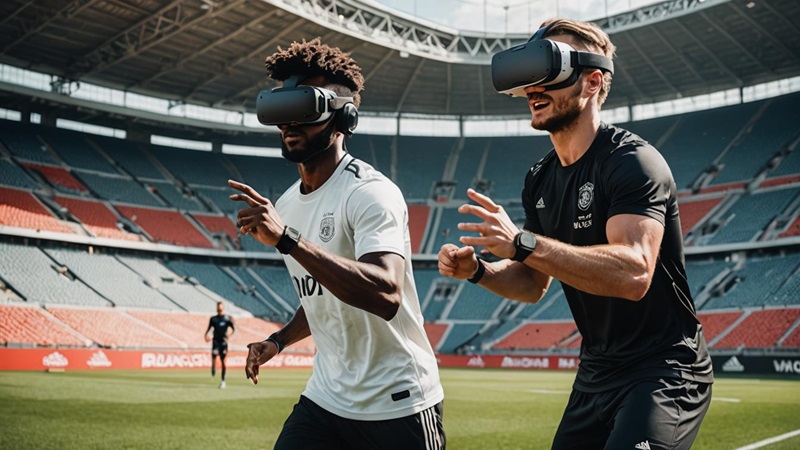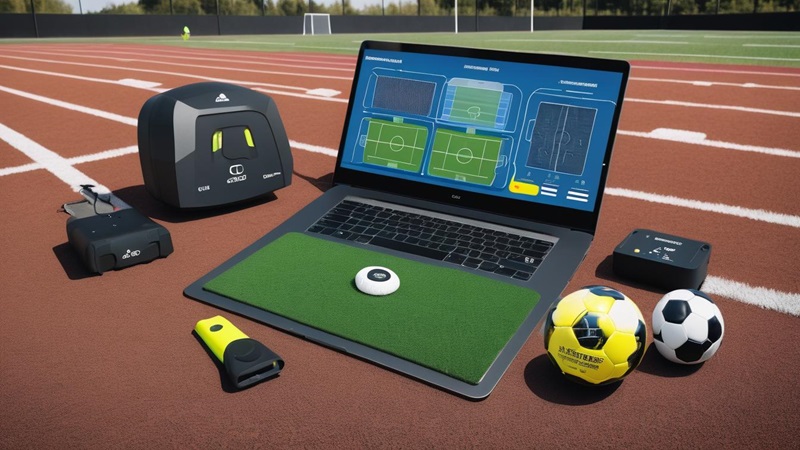The digital revolution in football: Technology in training and team management

The evolution of technology in football
Football, often referred to as “the beautiful game,” has undergone substantial changes throughout the years. The digital revolution in recent times has completely revolutionized the way the sport is both played and organized.
Technology now plays a crucial role in everything from individual player training to intricate team management tactics.

Data-driven coaching
Technology has revolutionized football by introducing the use of data to enhance player performance.
Training equipment now incorporates performance monitoring devices like GPS trackers and accelerometers.
These devices gather valuable information on speed, distance covered, heart rate, and other important metrics. By analyzing this data, coaches can develop customized training programs that address the unique requirements of every player.
Virtual Training and Simulations
VR (Virtual Reality) and AR (Augmented Reality) technologies now play a vital role in football training.
Players can simulate game scenarios in a controlled environment and practice tactics and strategies without the risk of injury.
For example, goalkeepers can practice defending penalties or free kicks in a virtual environment, while players on the field can practice their positioning and movements during the game.

Technology is also revolutionizing traditional training methods.
Using drones, coaches can record training sessions and matches from previously unattainable angles, gaining a whole new perspective on tactics and player movements.
Through detailed video analysis, strengths and areas for improvement can be identified, and more effective strategies developed.

Technology in Team Management
Managing Teams and Players
Thanks to technology, football team management has become more efficient.
Using special software, coaches and managers can track players’ performances, plan training sessions and analyze the collected data.
These tools provide an overview of each player’s physical condition and progress, enabling informed decisions on team selection and match strategy.

Team Communication
Technology has also improved team communication.
Mobile apps and online platforms allow coaches to send real-time instructions and personalized feedback to players.
Players can access information about their training plans, personalized diets, and recovery techniques, all of which contribute to better coordination and efficiency in team preparation.

Video Analysis and Feedback
Video analysis is another important tool in football team management.
Recordings of matches and training sessions are analyzed in detail to identify mistakes and find suggestions for improvement.
Feedback based on these analyses is then passed on to the players, helping them better understand what needs to be corrected and how to optimize their performance.

Tactics and Strategy Planning
Technology advancements have also helped with strategy and tactics.
The modeling of various gaming scenarios and the evaluation of their efficacy are made possible by sophisticated software.
Before using different formations and tactics on the field, coaches may test them, which lowers the chance of error and improves team performance.

Health and Recovery Management
Technology is essential for overseeing player health and recovery. Monitoring devices can identify potential injuries early on, enabling prompt interventions and the avoidance of serious issues.
Tailored recovery plans are created using the gathered data, guaranteeing a speedy and secure comeback to the game.

Technology and the Future of Football
Future Innovations in Training
As the progression of technology persists, football training is incorporating advancements.
Artificial intelligence (AI) and machine learning are employed to analyze extensive data sets and offer valuable insights.
For instance, AI has the capability to anticipate potential injuries by examining performance history and monitoring data, enabling coaches to modify training routines and avert such concerns.

Technology in Scouting and Recruitment
Technology has revolutionized scouting and player recruitment as well.
With the help of talent analysis software, clubs can now assess players from all over the world using objective data, including match performances and physical and technical statistics.
This shift minimizes subjectivity and mitigates the risks involved in recruitment, enabling teams to make informed decisions.
Fan Experience
The advent of technology has revolutionized the football fan experience.
With the availability of online streaming, augmented reality, and interactive apps, fans now have the opportunity to engage more deeply than ever before.
They can delve into real-time statistics, enjoy matches from various perspectives, and actively interact with their beloved teams and players via social media platforms.
E-sports and Virtual Football
E-sports is an emerging industry that is increasingly converging with conventional football.
Virtual football tournaments, like the FIFA E-World Cup, captivate a global audience of millions, both as spectators and participants.
Football clubs are now venturing into the realm of e-sports by establishing their own teams, blending their love for the sport with cutting-edge digital technologies.
Data Security
It’s understandable that despite the advantages technology brings, data security is still a significant worry.
Safeguarding personal details and performance data is crucial to avoid any misuse and maintain the fairness of competitions.
Football clubs are wise to invest in top-notch cybersecurity to keep this sensitive information safe.
The world of football has undergone significant transformations due to the digital revolution, impacting every facet of the game.
Technology has become a trusted companion, aiding in data-driven training, virtual simulations, team management, and enhancing the fan experience.
With constant innovations on the horizon, the future of football holds immense potential for further dynamism and engagement, opening up fresh avenues of opportunity for all involved.




